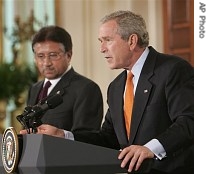2006年VOA标准英语-Bush Says He Is Unaware of Any US Pressure on P
时间:2019-01-12 作者:英语课 分类:2006年VOA标准英语(九月)
By Scott Stearns
White House
22 September 2006

President Bush holds a joint press conference with Pakistan President General Pervez Musharraf
President Bush says he is unaware 2 of any White House pressure to force Pakistan into joining the fight against terrorism following the 2001 attacks in New York and Washington. Pakistani President Pervez Musharraf says a senior Bush administration official threatened to bomb his country if it did not back action against the then-Taleban government in Afghanistan.
--------
President Bush says he was taken aback by the harshness of the alleged 3 U.S. threat which he says he first heard about in the morning's newspaper.
"I don't know of any conversation that was reported in the newspaper like that. I just don't know about it," he said.
In an interview to be aired Sunday on the U.S. television network CBS, President Musharraf says then-Deputy Secretary of State Richard Armitage told the Pakistani intelligence chief that the United States would bomb his country back to the Stone Age if it did not join the fight against the Taleban. President Musharraf says it was a "very rude remark."
Armitage says he was not authorized 4 to make such a threat.
Asked about it following White House talks with President Bush, President Musharraf said he could not discuss the issue because it is part of his new book.
"I am launching my book on the 25th, and I am honor-bound to Simon and Schuster not to comment on the book before that day," he said.
"In other words, buy the book. That's what he is saying," quipped Mr. Bush.
White House spokesman Tony Snow says the Bush administration did make clear to Pakistan that it had a choice to make following the September 11th terrorist attacks but it is not U.S. policy to issue bombing threats.
During their talks, President Bush and President Musharraf discussed relations with India, the Israeli-Palestinian conflict, and Pakistan's deal with tribal 5 leaders in its remote border region with Afghanistan. President Musharraf say tribal leaders have agreed to prevent Taleban and al-Qaida fighters from operating in the area, where the central government has little control.
That agreement has raised concerns among some U.S. lawmakers that it gives Taleban fighters greater freedom to operate in the area. President Musharraf says that is not so.
"This treaty is not to deal with the Taleban, it is actually to fight the Taleban," he said. "The misperception in the media I did clarify to the president."
President Musharraf says the agreement is part of his holistic 6 approach to fighting terrorism in tribal areas by using political, military, and administrative 7 resources. He has also called on Afghanistan to do more to fight terrorism on its side of the border.
President Bush meets with Afghan President Hamid Karzai at the White House next Tuesday, then brings both President Karzai and President Musharraf together for a working dinner Wednesday.
- I had a bad fall,which put my shoulder out of joint.我重重地摔了一跤,肩膀脫臼了。
- We wrote a letter in joint names.我们联名写了封信。
- They were unaware that war was near. 他们不知道战争即将爆发。
- I was unaware of the man's presence. 我没有察觉到那人在场。
- It was alleged that he had taken bribes while in office. 他被指称在任时收受贿赂。
- alleged irregularities in the election campaign 被指称竞选运动中的不正当行为
- An administrative order is valid if authorized by a statute.如果一个行政命令得到一个法规的认可那么这个命令就是有效的。
- He became skilled in several tribal lingoes.他精通几种部族的语言。
- The country was torn apart by fierce tribal hostilities.那个国家被部落间的激烈冲突弄得四分五裂。
- There is a fundamental ambiguity in the use of word "whole" in recent holistic literature.在近代的整体主义著作中,“整体”这个词的用法极其含混。
- In so far as historicism is technological,its approach is not piecemeal,but "holistic".仅就历史决定论是一种技术而论,它的方法不是渐进的,而是“整体主义的”。
- The administrative burden must be lifted from local government.必须解除地方政府的行政负担。
- He regarded all these administrative details as beneath his notice.他认为行政管理上的这些琐事都不值一顾。